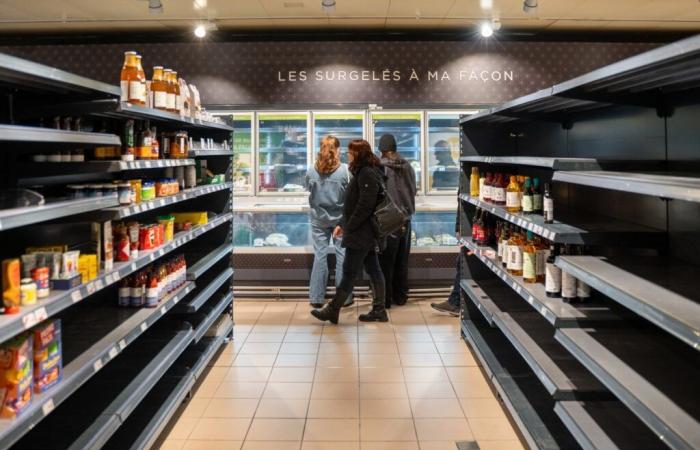Saturday, 1 p.m., basement of the Manor building in Delémont. Arriving at the bottom of the stairs, we briefly wonder if we dare to continue or if the food sector has closed earlier than expected: not a crumb of bread, not a fruit or vegetable with the exception of two or three cabbages reds and ginger which keep warm together, and the same in the rest of the stalls, robbed, sometimes made a mess. “The hurricane has already passed for a while,” notes a customer. Quite a “weird”, “gloomy”, “sad” atmosphere, others say.
“Well sold”
All merchandise had been marked off at 50% for a week (obviously still not enough for someone to consider grabbing a batch of “Pataclette”, frozen potato halves filled with melted raclette cheese which the freezer was still full of). “It sold well,” said a salesman modestly. He hesitates to speak: he is the only one of the ten employees, twelve including the butcher’s shop, who will be reassigned elsewhere by the company, slips a colleague.
One will retire in the sequence, “and the others will head to the Regional Placement Office”. Some had only been there for a few years, others were sometimes 25 or 30 years old.
At the checkouts, the smiles struggle to mask the heaviness of the climate for the last few hours. The last week of liquidation was emotionally trying. “A real massacre,” says one. People rushed in, sometimes with shopping carts costing 500 francs. It felt like wartime or a return to the beginnings of Covid. Some arrived with 10 kg of salt or 15 packets of laundry.”
The employee pauses, then continues: “It’s as if people were trying to take everything as quickly as possible. We were there in the middle, at the checkout. We had the impression of being robbed. And most often, they were people we had never seen here.”
“Schneuquer”
This couple, who came to “schneuquer”, admits it frankly: “We usually never came, except for pleasure purchases. Otherwise it wouldn’t fit into the budget.” This lady is surprised at the prices “off the mark for a working-class region like ours”.
“Not more expensive”
Since the announcement of the closure, the question of the price range, reputed to be higher than that of the major distributors, has often been put forward to explain the bad figures brandished (but never revealed) by the brand. A cashier, thirty years in her job, puts things into perspective: “This was the case in the past, but it wasn’t so much for at least twenty years. Manor had to fall in line. But this image persisted in the people’s heads.”
More expensive or not, all the customers interviewed agree on one thing: we found things at Manor that we cannot find elsewhere. This couple of Italian origin enjoyed mozzarella and burrata there. Madame grabs a packet of hazelnuts as an example: “They come from Piedmont, they are the best. Cannot be found anywhere else.”
A lady from Franches-Montagnes: “I came there every time I was in Delémont.” She slips in passing: “I have the impression that everything is closing in this city. It’s worrying, but it’s also the fault of the people who order everything on the internet.”
A couple from Tavannes also speaks of Manor as an essential stop in Delémont. Monsieur observes: “Previously, there was a branch in Moutier and Tavannes. From now on we will have to go to Bienne and we will come less often to Delémont.”
Slow tumble
The employees questioned all have their own ideas about the reasons for this closure. “Attendance started to decline twenty years ago,” notes one. Another points out the competition from Aldi and other Denners, while his colleague is convinced that it is the fault of the lack of parking space. A mixture of all of these, no doubt.
What will happen to this space? It remains the property of Manor, which owns the building, but nothing is yet known about a possible tenant. As for the employees, they will be at work on Monday for their last days of contract, without really knowing what will be asked of them.
News-Swiss






